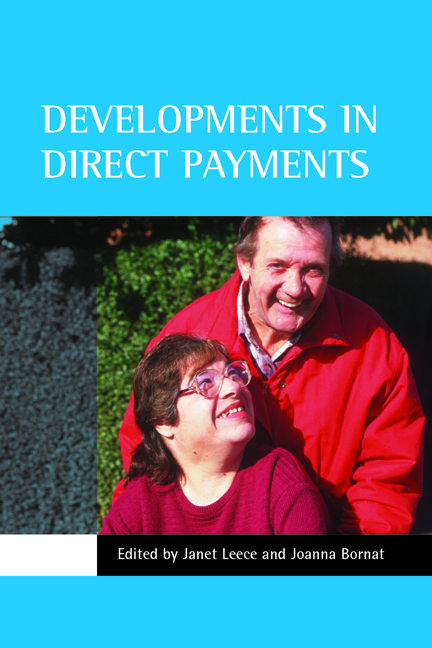Book contents
six - “It’s meant that, well, I’m living a life now”: older people’s experience of direct payments
Published online by Cambridge University Press: 18 January 2022
Summary
Most studies on direct payments have focused upon the experiences of younger disabled people, and little is known about how older people work with direct payments and the benefits they derive from them. This chapter seeks to address this gap in knowledge by presenting partial findings from a study (Clark et al, 2004) undertaken with older direct payments recipients in three local authorities in England. The study, with Helen Gough as research assistant and Ann Macfarlane as consultant, involved 41 older people, and sometimes their partners, receiving direct payments and was conducted between January 2002 and July 2003. The ages of the older participants ranged from mid-sixties to early nineties. Six older Somali women, all of whom were refugees, were among the participants. Although 32 local authority care managers, 11 team managers, five senior managers, and 10 direct payments support service workers also participated, this chapter is based mainly upon the experiences and perceptions of the older people.
Loosely structured individual interviews and discussion groups were used to gather the data. We met with an informal advisory group comprised of three older women, all of whom were receiving direct payments, at the onset and on three further occasions during the course of the research. This helped ensure that our focus and the questions we asked remained firmly fixed upon the things important to older people. Two of the women, together with an older couple from another local authority area, also served on the national advisory group to the research. The Somali participants took part in two group discussions, hosted by a Somali community centre and facilitated through interpretation by community workers attached to the centre. It was the women's preference that we use known and trusted community workers to interpret for us.
Background
In February 2000, the scope of the 1996 Community Care (Direct Payments) Act was extended to older people in the UK. This followed sustained pressure by organisations such as Age Concern and the National Centre for Independent Living (Glasby and Littlechild, 2002) and calls by older people themselves. When the Act had first been implemented in 1997, local authorities were not allowed to offer direct payments to people aged 65 and over.
- Type
- Chapter
- Information
- Developments in Direct Payments , pp. 79 - 94Publisher: Bristol University PressPrint publication year: 2006
- 1
- Cited by

